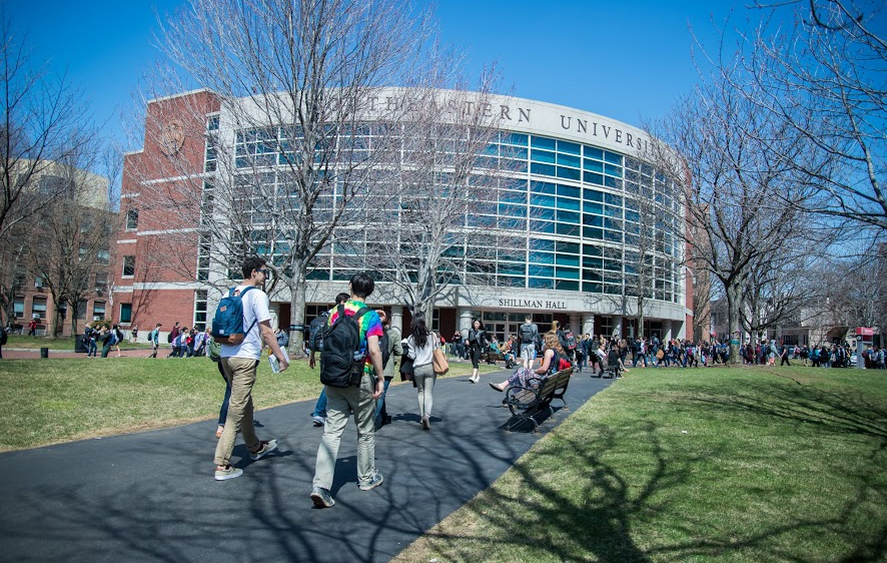By Elise Harmon, news editor
Northeastern University’s ranking has dropped in US News and World Report’s National Universities Rankings, breaking an explosive upward streak that took it from No. 115 in 2006 to No. 42 last year .
The university dropped from the No. 42 spot to No. 47 in the 2016 rankings, which were released last Wednesday. Northeastern tied with three other schools for the placement: Lehigh University, Pennsylvania State University at University Park and the University of Florida.
“Rankings are never the goal, they are simply the byproduct of success,” Renata Nyl, assistant vice president of communications, said in a statement to The News on Tuesday. “The full measure of any institution is best captured by its successes.”
In Boston, Northeastern lagged behind Boston University (No. 41), Boston College (No. 30), Massachusetts Institute of Technology (No. 7) and Harvard University (No. 2).
“In my perspective, I don’t think that [the university’s ranking going down] is a big deal,” Morgan Helfman, a third-year political science and sociology major and executive vice president of the Student Government Association, said. “I think Northeastern focuses way too much on the numbers when I think we should put more effort into education.”
Helfman doesn’t think Northeastern’s appeal has anything to do with rankings.
“I wasn’t too concerned with rankings when applying to schools,” she said. “What sold me and a lot of my friends was the co-op program.”
Despite dropping slightly in the rankings, the university was still ranked No. 6 in US News’ first Most Innovate Schools ranking. The list was based on nominations by other college presidents, provosts and admissions officers.
To rank national universities, US News weighed a variety of qualitative factors. This methodology was unchanged from the 2015 rankings, according to the US News website.
A large majority of the weight of the scoring system goes to three factors – a peer assessment by the leadership of other universities and high school guidance counselors (22.5 percent), the university’s first-year retention rate and six-year graduation rate (22.5 percent) and “faculty resources” (20 percent). These resources include class sizes, average faculty salary, the student-faculty ratio, the proportion of professors with the highest degree in their field and the university’s proportion of full-time faculty.
Other factors included freshmen students’ admission test scores, high school class rankings and the college’s acceptance rate (12.5 percent), financial resources (10 percent), graduation rate and performance (7.5 percent) and alumni donations (5 percent).
Al McCready, a professor who teaches in Northeastern’s Doctor of Education program, doesn’t believe that these factors accurately reflect universities’ quality.
“When you look at the factors that make up the rankings, and you see how potentially flawed they are, and then you look at the simplicity and generality of it, you know it doesn’t really tell you too much about the factors that could be really important,” he said. “Like the culture of the school. Northeastern differentiates itself greatly [with its co-op program].”
Kim Chorosiewski, a consultant at educational planning company McMillan, Howland & Spence, has made a career out of helping students through the college admissions process. Chorosiewski is currently completing her doctorate at Northeastern and teaches in the sports leadership graduate program.
College rankings may be a starting spot for students looking at schools, according to Chorosiewski, but the difference between No. 42 and No. 47 is a matter of splitting hairs.
“I don’t think it’s even a blip on the map for Northeastern,” she said. “Had they dropped 20 or 30 [spots] they may have raised an eyebrow.”
Last year, a Boston Magazine article suggested that Northeastern had manipulated the college rankings system to make its score higher in a number of ways, including by making its admissions process easy in order to artificially inflate the university’s acceptance rate. Northeastern has generally refuted these claims.
“Over the past several years, Northeastern has pursued a strategy of building excellence across every dimension of the university,” Nyul said. “We have enrolled high-talent students, recruited path-breaking faculty and doubled down on the ‘Northeastern Advantage’ — experiential learning and research that is in tune with the world.”
Elan Axelbank, a third-year sociology major, believes that Northeastern fell in the rankings simply because they had to fall sometime.
“I think that the way that Northeastern has been climbing in the rankings has been to some degree superficial,” Axelbank said. “This shows us that that type of progress is unsustainable.”
To students already enrolled in the school, the ranking rarely matters.
“Our primary concern should be the best education possible,” said Axelbank. “Not what’s going to make us the most money.”
Photo by Scotty Schenck














